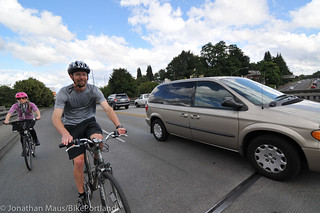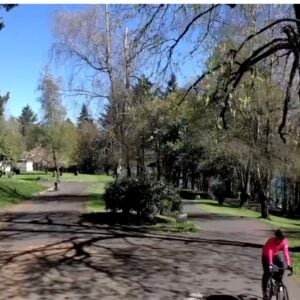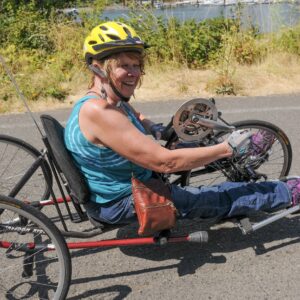At their best, Lyft and Uber are better cab companies, one more piece of a system that enables low-car life.
At their worst, they’re a system for subsidizing an army of people driving around town with their eyes glued to GPS screens.
Portland’s new regulations of for-hire transportation companies, released last week, include an interesting change that’s supposed to target the problem: the city’s first mandatory safety training for drivers of taxis and “transportation network companies” like Uber or Lyft.
“There will be thousands of drivers from both the taxis and TNCs that will undergo this training,” city spokesman John Brady said in an email Wednesday. “We are forecasting that they will give over 3.6 million rides next year. So training them in the basic Vision Zero principles and specifically as they relate to people who walk and people who bike represents the chance to spread the Vision Zero message to a sector that is central to Portland’s transportation system.”
This intriguing detail was first reported by the Mercury. We asked Brady if there are any other details yet.
Not really. It’s not clear whether there will be a written or other test involved, or what exactly will be taught.
“At this time, we don’t have the set content for the Vision Zero training,” Brady said. “This will be defined once the regulations become permanent.”
Advertisement
Per the new regulations, here’s a summary of the city’s current safety training rules for cab drivers:
Drivers must pass a City-administered knowledge and within 6 months of issuance of a driver’s permit, drivers must certify completion of City-approved driver safety and customer service training. Permits automatically revoked if not successfully completed within 6 months.
And here’s the new language agreed to by a city task force that was convened by Transportation Commissioner Steve Novick.
Drivers must successfully complete trainings administered and/or
approved by PBOT within 30 days in the following subject areas:
- PFHT Code provisions and rule
- Vision Zero principles of traffic safety
- Portland-area attractions
- Customer service
If this isn’t the first such set of rules in the country that specifically calls out Vision Zero (the concept of systematically finding and eliminating the public factors that contributed to every road death), it’s one of them. Earlier this year in San Francisco, a collision between an Uber driver and a person biking called attention to that city’s stricter safety training requirements for taxi drivers.
The new rules will also apply to pedicab operators.
— Michael Andersen, (503) 333-7824 – michael@bikeportland.org






Portland should require all drivers to take Vision Zero safety training.
Oregon should require all drivers to take Vision Zero safety training.
Yeah, we need to change the name from “Vision Zero Training” to “Standard Driver Training”, and require it of all drivers, not something special just for those who take on paying passengers. It should be part of the standard curriculum of the accredited driving school all aspiring drivers should be legally required to complete before applying for a license.
Perhaps a first step (vs. all drivers) would be for CoP to require it of:
-City staff driving motor pool cars or private vehicles for work (PPB too); and
– Contractors and delivery staff (working on City contracts) driving motorized vehicles weighting more than 10,000 GVW and,or >18 feet long (standard parking stall).
Great idea. Go further by requiring the training yearly.
Better road users is one of the facets of a Safe Systems approach to road safety. A national push to require at least bi-annual driver license testing should be enacted with highway funding strings attached, like the 0.08 BAC was.
Alternatively, States can enact stricter rules for driver licensing. It would be curious to have an analysis of the insurance rate benefit of such a policy. BTA (the big picture guys)?
I think that all drivers (cabbies included) should be forced to commute by bike for at least three months prior to getting their license. That will teach them more about safety and what to look for than any training class.
“forced to commute by bike”
I understand the sentiment, but let’s be really careful how we use words like force and bike in the same sentence. Biking is wonderful and fun and healthy and cheap and life altering; let’s not frame it as a punishment, please.
Agreed. It’s also worth noting not everyone is able to ride a bicycle.
Why isn’t this mandatory for all motor vehicle operators?
Operation of private for hire on city streets is a franchise the cities control. Licensing of motor vehicle operators is a State function.
Everyone knows that, but it does little to address my comment.
These are bureaucratic checkboxes that won’t actually lead to safer streets because they don’t remove cars from streets. To pretend that we’ll ever reach 0 fatalities so long as cars are allowed free reign is a fantasy.
Well which is it your pushing for? Remove cars from streets or disallow them free reign? Those are two very different ideas.
I’ve been pretty consistent about this. Cars get to travel on major thoroughfares built for them (39th, Powell, Broadway, most of downtown) and are disallowed entirely from certain pedestrian-friendly zones (Clinton, Belmont, Alberta). Neighborhood streets would be reserved for cars from the neighborhood (which would have to display a windshield sticker w/ yearly renewal). Cars on residential streets that don’t belong to the neighborhood must either purchase a daypass or be subject to ticketing… which would discourage neighborhood cut-throughs while allowing people to drive to their homes.
Until we start disallowing cars from the streets vision 0 is just a vision and not attainable. If politicians were serious about 0 traffic fatalities they would start taking drastic measures to make that happen.
Endo,
That’s a very pessimistic view. No more ambulances? Fire trucks? Police cars? School buses? Tri-met?
Some northern European countries are at or below 2 fatals per 100,000 population each year already, without banning private auto use.
You have no evidence to make that statement. We won’t know the effectiveness of this program until it is in place for some time.
What a joke! I’ve witnessed City of Portland employees driving recklessly and illegally on more than one occasion. COP can start by cleaning up its own employees’ behavior.
A water bureau dump truck executed a right-turn-on-red after slowing down, almost hitting me on my bike proceeding through a signalize intersection on the green.
A Portland cop using a bike lane to pass a vehicle turning left, even though the cop’s delay would have been a few seconds.
A water bureau pick-up pulling a trailer driving southbound on I-5 at a speed I estimate in excess of 65 mph (I was driving 50).
maybe they will (also take this course) and maybe it will start to make a difference. Let’s not rain on every parade, eh?
JR,
If you’re expecting perfection from any particular group you wish to single out, you are in for a lot of disappointment.
I don’t expect perfection – just an honest attempt at being better than awful. And I DO think the performance of the employees of the City of Portland should be significantly better than average. Portland employees are well compensated and should be held to a high standard. The three examples I cited are just that – examples of what I have witnessed.
Get off your damn smart phones while driving. Really how damn self-absorbed can you be? Pull over to respond, do not drive with your eyes off the road, ever!
Don’t forget to remove those ear-buds regardless of the vehicle you are operating.
What?
People driving cars are not the only ones prone to distraction.
Right. All those distracted walkers and bikers mowing people down, sending them to the hospital or the morgue.
heh.
It’s not a bad policy, but I think this is more misdirection. Anything that focuses on human behavior is incidental to Vision Zero. If the goal is to get down to zero road violence, the means need to be material and structural. If you rely on people to follow the rules, expect to be disappointed.
The road infrastructure should be self-policing.
No. there is not enough money in the world to design and build roads that prevent all collisions caused by stupidity or inattention.
I don’t think that is accurate. My understanding of Vision Zero is that it is a ‘leave no stone unturned’ kind of thing. We can’t afford to say ‘it’s all about infrastructure’ or ‘if we only had better enforcement’ or ‘why can’t people just pay attention’ or whatever. I see this as one (perhaps predictably bureaucratic but nevertheless) promising gesture in this direction. I mean we want them to instantiate Vision Zero, don’t we? So they have to start somewhere.
Alan,
the Safe Systems approach to road safety (see OECD) attacks the problem from multiple fronts. Better roads, yes. Better laws, yes. Better emergency care, yes. Better enforcement, yes. Better road users, yes. Better adjudication, yes.
One of the tenets of the Safer System approach is that road users, forever, will make mistakes. Minimizing the outcome of those mistakes needs a holistic approach.
If the city hasn’t already roughed out some draft of the form the Vision Zero safety course will take, it’s difficult to tell what its chances are of being very effective. If vaguely conceived, this could just turn out to be another token gesture towards working to have streets be safer.
That people choosing to use bikes as their mode of travel in traffic with motor vehicles, are not obliged to take any safety courses or tests to verify their ability to safely ride a bike in traffic, has contributed to the problem of there being on the road, people with little to no idea of how to safely ride in traffic.
If the course material turns out be good and helpful, maybe the city should consider assembling some plan to invite people that bike, to also take the course. Improvements in skills of people riding bikes in traffic, would make for a more comprehensive approach for reaching Vision Zero’s objective of streets safer to use.
I think elementary schools should teach kids safe biking skills while there young. Basic things like hand signals and helmets. Then middle school/high schools adds on stuff such as lights and other things for night riding.
It’s harder to get people to change once they are set in their ways, so set them on the right path earlier.
Mao, you’re in luck! This program exists in Portland…
http://www.portlandoregon.gov/transportation/40511
…and there’s currently an effort to get it funded at the regional level for people outside Portland.
http://bikeportland.org/2014/08/26/ma-closer-look-at-safe-routes-campaign-110320
You can get involved here if you want.
http://ourhealthystreets.org/for-every-kid-main/foreverykid/
I remember fully well going through bicycle lessons in class multiple times in elementary and middle school – back in the late 70’s. In a tiny little town in Kansas and after moving to Detroit.
There was no special program, it was just something that was taught to everyone.
When I was in elementary school, there may have been some kind of basic instruction for biking, including learning hands signals. I’d be surprised if kids today aren’t generally instructed early on about what stop signs, red lights, green lights and yellow lights are, whether or not they ride a bike to school.
Where I grew up though, was far removed in terms of trafic from that of towns or the city. Just two lane country roads and neighborhood lanes, not much traffic. In that type situation, not too tough to ride reasonably safely even being small and not having a lot of well grounded bike in traffic skills.
Having to deal with big multi-lane roads and heavy traffic, is where demands on biking skill can be really great. We want to see more people biking…and to be able to handle those conditions well, they need to be prepared with a good understanding of how roads work and how traffic is managed by way of the signs, signals, and basic road use procedures.
I remember participating in bike skills training/testing at my elementary school. It was an after-school “bike rodeo” and was focused more on bike handling skills than how to ride in traffic. Helmets were unheard of back then, and there may have been an assumption that we kids would never ride in traffic, so the focus was on how not to crash your bike.
Safety training is good, but it has to be undertaken carefully. Imagine kids being shown the full dorkification they must undergo to become “safe” riders, and the feelings they will have about riding vs. driving when they turn 15. If safety training is not emphasized even more for prospective drivers, then I can imagine most image-conscious kids wanting to get out of Dorkville and move to Coolton at their earliest opportunity. Further, if the sole emphasis is on putting the onus of safety on the vulnerable party, then once those kids graduate to driving, they’ll know they don’t have to really pay attention any more since those bikers will be scurrying out of my way to go hang out in their retro-reflective dork club.
“I think elementary schools should teach kids safe biking skills while there young. Basic things like hand signals and helmets. Then middle school/high schools adds on stuff such as lights and other things for night riding. ….” Mao
Yes… . Starting kids out with ideas of what helps towards safe biking, such as the use of hand signals for turns and stops, while they’re in elementary school, sounds like a generally good idea…though I’d hope not with the idea that at those ages, they’d be alright to ride in traffic.
As people go into their teens, get physically bigger and stronger, and have places they need and want to go, perhaps on a bike and independent of someone escorting them around, is the point it seems to me that really solid bike in traffic skills become essential.
Also, I’m inclined to think that more people biking, consistently and very visibly displaying hand signals for turns and stops to other road users, could in the long run, be very useful leverage in supporting efforts to reduce bad driving…reducing bad driving being one of the key objectives of Vision Zero.
(Michael…thanks for posting the links.),
I hope it includes “Do not park or idle in the bike lanes.”
Vision Zero is about reducing the number of fatal and serious injury crashes. Many will be disappointed when funding for inconvenience issues is denied as secondary to the primary goals.
You don’t think it is a safety issue when bike lanes are obstructed?
S,
I think it can be a safety issue, but I am dubious many people are dying or becoming severely injured from such behavior, compared to running red lights, or speeding in general, or at signals without protected left turn phases.
Seeing how fatalities of pedestrians and cyclists in Portland have occurred in crosswalks and bike lanes, I don’t think it is too much to teach professional drivers safe practices regarding crosswalks and bike lanes.
The amount of pedestrian/ cycling traffic is greater in Portland than in many cities and although a licensed OR driver may see a few questions on their driving test they may not be familiar with driving in Portland if they live in the suburbs or have just moved here.
“So training them in the basic Vision Zero principles and specifically as they relate to people who walk and people who bike represents the chance to spread the Vision Zero message to a sector that is central to Portland’s transportation system.”- from the article.
I seriously doubt that it would be too costly to include the instruction not to use bike lanes or crosswalks as your loading zone within the “Vision Zero principles as they relate to people who walk and people who bike.”
To me, it seems like this would fit in perfectly with look for and yield to cyclists and pedestrians in bike lanes and cross walks.
This is why I think Vision Zero shouldn’t be used as the sole decision criterion for government funding/decisions. Minimizing fatalities and serious injuries directly from crashes is one good goal, but there are all kinds of other serious impacts from our transportation system that should be considered too.
What about:
*Illnesses and deaths from activity avoided when people drive instead of taking active transportation?
*Future illnesses, deaths, and disruption from climate change caused in part by carbon pollution from vehicle emissions?
*Illnesses and deaths from local air pollution due to vehicle emissions?
*Households’ financial impact (and let’s make no mistake, lots of people in Portland spend a lot of their life energy making money so this is serious business) from feeling like car travel is the only reasonable option?
How much will this training cost or is it free, will it be instuctor led or online?
I think it’ll be free to the person taking it, funded through a city fee on all taxi and TNC rides.
Will the content of the Vision Zero training for taxis / TNC drivers include review by the PBAC? Or having a PBAC member tasked to this process would be an important step.
The comment “At this time, we don’t have the set content for the Vision Zero training,” is both an opportunity to get it right and a chance to rush something due to the 30 day window for certification.
It’s is actually kind of redundant. Much of my interest in road safety started in defensive driving classes before I was employed to drive a cab (seeing how people drive with that job only intensified my interest).
It was required at both Broadway and Radio (well almost 20 years ago). I doubt it has changed, if my memory serves me right – it was required of their insurance companies.
Any update on this program? And is there a push to include commercial truck operators under contract with City services (RFPs, delivery permits, construction ,etc.)?
http://www.bbc.com/news/uk-politics-25942323